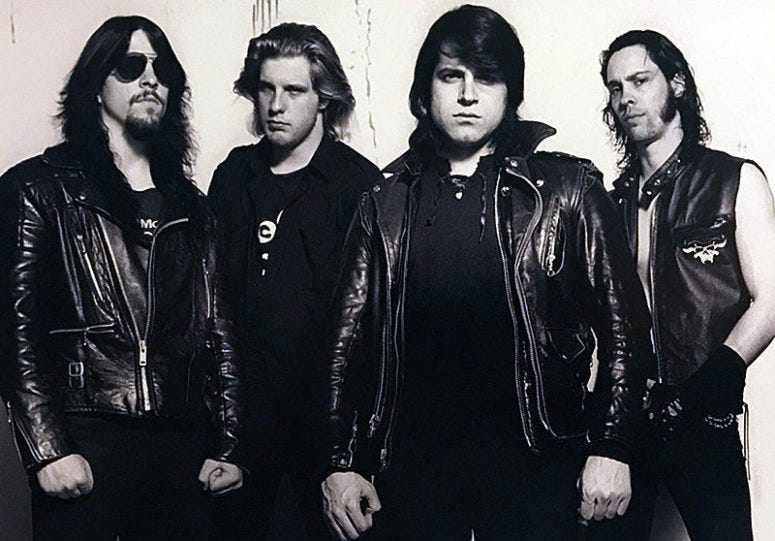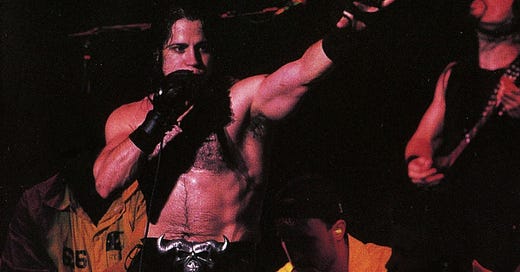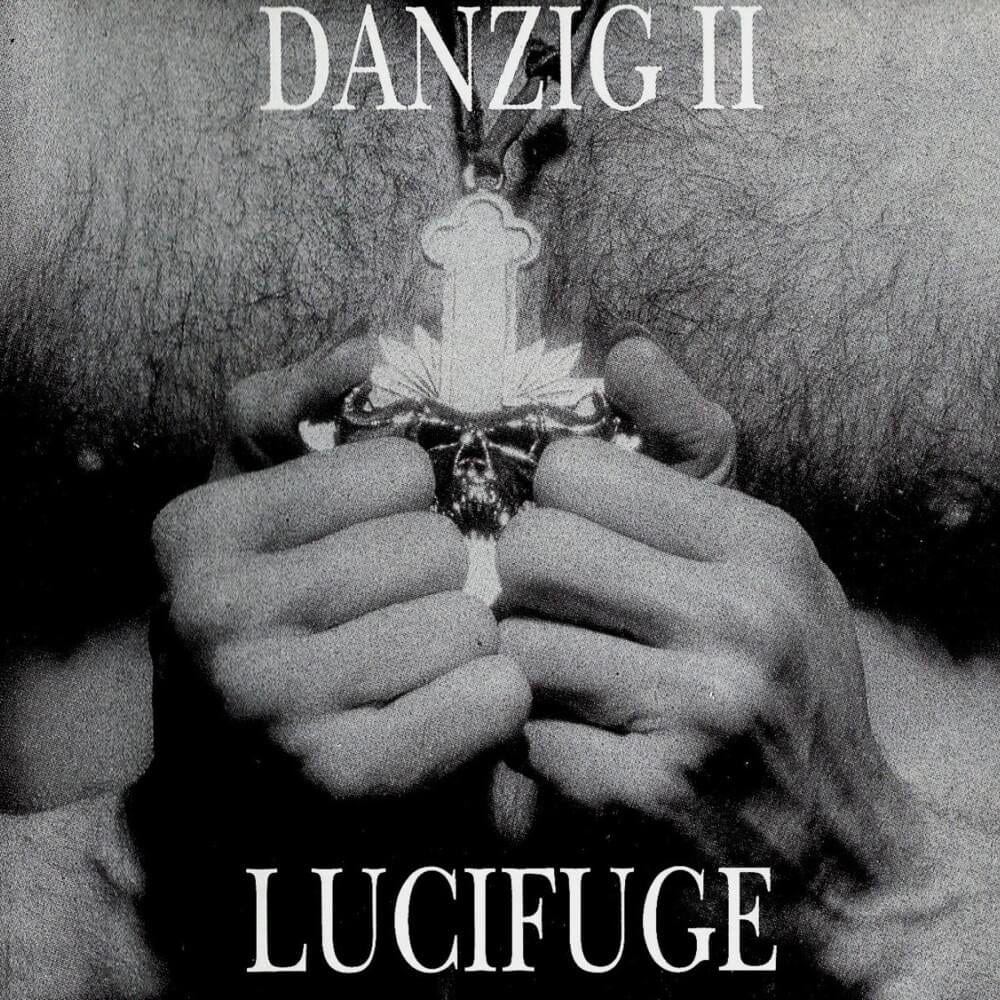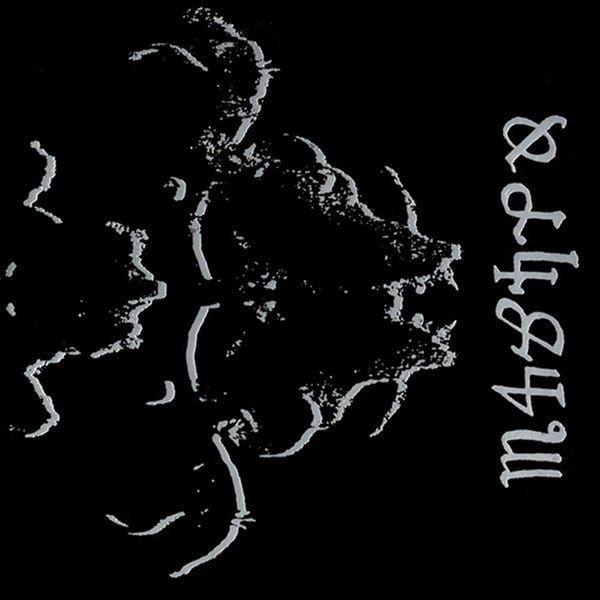Blackest of the black
Darker than night
Come to me my bleeding light
See she comes
She comes now
Enter oblivion
Yea, here she is
Harder than life
In my arms
See she there
Entwined with love
Unclean she is
— “Her Black Wings”
Black Sabbath, Metallica, Slayer, Iron Maiden, and Danzig.
Every one of these bands have a legendary “first four.” For Metallica, their first four—Kill ‘Em All, Ride the Lightning, Master of Puppets, …And Justice For All—represents their entire thrash metal oeuvre before they transitioned into the world’s most popular heavy rock band. For Black Sabbath, their first four records developed and defined the sound of heavy metal.
For Danzig, a band with its roots deep in the mud of horror punk and dethrock, their first four albums are often upheld as the pinnacle of the band’s creative powers. Nothing after Danzig 4 can compare. That is the consensus, at least. And while true fans know and love Glenn Danzig’s symphonic, proto-dungeon synth album Black Aria, Danzig’s first four albums remain quintessential listening. The rest can be enjoyed or overlooked at your discretion.

Danzig’s self-titled debut was deeply out-of-step with the rest of the metal world in 1988. While everyone else was pushing the speed and ferocity of thrash metal to the point where death metal emerged from the swamps of Florida and the frigid streets of Sweden, Danzig arrived and reminded metalheads about the roots of their genre. Released by Def American Recordings, and produced by hip-hop specialist Rick Rubin, Danzig is a forty-minute monster of blues-based heavy metal. There is no hardcore or punk on this record; thrash cannot be found either. All the songs, from “Twist of Cain” to “Evil Thing,” are primarily mid-paced headbangers driven largely by John Christ’s muscular guitar work and Chuck Biscuits’s hard drumming.
Speaking of “Twist of Cain,” the song was originally recorded by Samhain. The original is faster and more punk-influenced. The better known version is a slowed down and crunchy metal number about sin. According to guitarist John Christ, “Twist of Cain,” “Soul on Fire,” “She Rides,” and “Not of this World” all have their origins in the Bible. “Twist of Cain” makes it obvious, as Danzig sings about how Cain’s murder of his brother created a hereditary taint in the human soul.
I can feel it move me
Feel it shove me
As I break the law
Said yea
I can feel it's jabbing
Cuts the numbness then I
I come alive yeaTwist of Cain
Yea drives my brain
Yea twist of Cain
Make me come alive
'Cause it does
“Not of this World” keeps with the theme of Bible-based esotericism by focusing on the Gospel of John. The song’s narrator is a fallen angel questioning humanity about power and existence.
And you think that you know
The reason I'm alive
Truth is you only know the lies
And I feel all the things
You could never understand
Choose where you stand
Am I mortal
Are you
Man
As mentioned in the first post of this trilogy, “She Rides” is undoubtedly about the seductress Lilith—Adam’s first wife who, after being scorned, turned into a demon lustful for the blood of pregnant women and children. As with almost everything Danzig does, “She Rides” drips with sexual energy. Said sexual energy is further reinforced by the song’s blues rhythm, which has long been held to mimic the gyrations of intercourse.
Danzig displays a man and a band interested in things well beyond the normal scope of horror punk. Noted book enthusiast Danzig penned an album about the occult, sex, and death, while the musicians around him crafted complex and intricate songs that still manage to get heads banging. Of course, Danzig is famous for one song— “Mother.” “Mother” would become the biggest hit of Danzig’s career five years after its original release. In almost every aspect, “Mother” is a perfect hard rock song. It consistently builds up to multiple crescendos, has an easily identifiable riff, and features Danzig at his very best as a vocalist. Lyrically, “Mother” is foreboding and threatening, and sounds as if a young tough is challenging a pair of unknown authority figures.
Father
Gonna take your daughter out tonight
Gonna show her my world
Oh fatherNot about to see your light
But if you wanna find hell with me
I can show you what it's like
'Til you're bleeding
“Mother” is said to be about the PMRC, the Congressional body that investigated rock music in the 1980s ahead of creating the “Parental Advisory” stickers that once adorned album covers everywhere. Danzig has said in multiple interviews that the PMRC’s attack on heavy metal drove him to write “Mother,” which is nothing more or less than a full-throated provocation against all censorious scolds.
Danzig’s second release on Def American Recordings, 1990’s Danzig II: Lucifuge, continues the heavy blues metal of the band’s first record. Recorded in Hollywood between the summer of 1989 and spring of 1990, Danzig II: Lucifuge contains some of the best-written songs of Danzig’s entire oeuvre. See for instance “Snakes of Christ,” a song about perverted Christianity and the corruption of Christ’s messages by institutional churches.
Time to run, yeah
Time to hide
Holy war in the land of fire
Never tempt the
Wrath of gods
Gonna dance in the death of life
Take the hand
Enter the world
Just remember you will surely die
Never sell
Evil for lies
Gonna give to you the kiss of lifeSerpents of the lord
Crawling
To the will of god
Serpents of your lord
Crawling
All evil
While “Snakes of Christ” carries with it socio-political overtones, most of Danzig’s second album is about Glenn’s deepening interest in dark mysticism and the occult. “Long Way Back From Hell” ruminates about a voodoo ritual’s attempt to resurrect a vengeful soul.
Sold into slavery down in New Orleans
Goddess of the bayou light
Black dog's head on the killing bed
Severed and left to bleed
There on fire in the corner of the world
There in misery
There on fire in the corner of the world
Left for God to seeDo you want to take a life?
Do you want to cross that line?
'Cause it's a long way back from Hell
And you don't want to go with me
“777,” the album’s eighth track, deals with the Christian view of Armageddon. Of course, it would not be a Danzig record if sex did not come to play. “Devil’s Plaything” and “Her Black Wings” both speak of temptresses with auras that push their male victims into a kind of sexual frenzy. Danzig may know a thing or two about alluring, yet fallen women. After all, he was photographed and likely dated Japanese porn star Fujiko Kano at point.
But not everything is devilry and lust on Danzig II: Lucifuge. The Roy Orbison-inspired “Blood and Tears” is a classic ballad with a Danzig twist.
All alone
In your misery
So alone
Could you have
Been deceived
Since I've been gone
I hear you been cryingYou cry a thousand tears
Darling don't despair
I know your heart still bleeds
Darling don't you care
There's blood in your tears
A different kind of sorrow pervades “Tired of Being Alive.” On this track, Danzig croons about a man who no longer cares about the distinction between life and death. In fact, the song’s subject longs for the sweet release of un-life.
Don't care
If 'n' you die
Ain't got no reason to cry
Don't feel
Don't need to
Your world ain't nothing to me
I'm fear
I'm your heretic
I'm doom waiting for the number
7 up 7
To the 6 on 6
Bring it on to me
Just as the band were starting to gain attention for their unique style of throwback metal, Danzig decided to change things with the release of their third album, Danzig III: How the Gods Kill, in 1992. Another Rick Rubin production, Danzig III: How the Gods Kill swaps a lot of the heavy, blues-based metal of the previous two Danzig albums for goth rock trappings. More melancholic than metal, Danzig’s third album is often upheld as the band’s finest recording. (Bassist Eerie Von has long maintained that it is the band’s best.) It is certainly a departure, and even the album’s cover, which is a variation of Swiss artist H.R. Giger’s Meister und Margeritha painting from 1976, differentiates it from the first two albums.
The title track, which is longer and more dour than most Danzig songs, is about self-knowledge, or enlightenment, with the purpose of throwing off the bonds of organized religion and morality. It is, in short, Promethean and Faustian.
If you feel alive
If you got no fear
Do you know the name
Of the one you seek?
If you want the answer
If you want the truth
Look inside your empty soul
There you'll find the noose
While “How the Gods Kill” is more subtle in its anti-Christian messaging, “Godless” is far less oblique. Here, Danzig screams invectives against the church.
I can't believe in all your pain
Under the draining of a
Christian
Delities blood
You tell your children they're insane
I couldn't love it anymore
And so you leave me
Godless
Just spread your tentacles
Of hate
Around my life
I've taken more than you could ever give
While much of the third album departs sonically from the previous two Danzig records, there are overlaps. For instance, “Sistinas” is a romantic ballad in the same vein as “Blood and Tears.” Here, Danzig pines for a lost love who is either gone or dead.
The sun don't shine
The wind won't blow
When you go hide
Without your love
I'm lonely
Deep inside
“Dirty Black Summer” is not only the album’s most popular song, but it also the one track on the record that upholds the traditional Danzig sound of sensual and heavy blues metal. Although Danzig has stated in interviews that “Dirty Black Summer” is a nostalgic ode to his high school summer back in New Jersey, the lyrics point towards something more sexual.
No summer in the winter time
Will keep you warm like a funeral pyre
Nothing drips like an August night
I got a feelingI'm on a dirty black summer
Looking back, Danzig spent an unimaginable amount of time working between 1988 and 1994. In that period, the band recorded four studio albums, performed several tours, and released a live album. Glenn also managed to complete an instrumental record in there, as well (the aforementioned Black Aria). Danzig were a machine, and by the time they released Danzig 4, they were one of the biggest bands in the world.
Danzig 4 is, for this humble writer, the band’s best work and the culmination of all the lyrical and musical themes of the band’s discography up to this point. The fourth album combines heavy metal rockers like “Going Down to Die” and “Until You Call on the Dark” with gothic, industrial-tinged tracks like “Cantspeak.” Danzig’s writing is also near-perfect on this album, with songs exuding macabre sexuality at almost every turn. “Invocation,” for instance, tracks the progress of an incubus’s oppression of an unnamed female.
The demon calls to me at length
Demon has no other strength
Except to end the stretching thighs
For those whose fate it is to dieThe demon has but one mistake
He lingers where he should not stay
He should not stay but rather go
Demon has no soulThe demon has no soul of such
His breath is cold as winter's touch
His hair, the blackness of the night
Demon offers up his bite
In “Little Whip,” BDSM takes center stage, as the narrator threatens and cajoles his partner to experience pleasurable pain.
You crawl across the floor
On your hands and knees
To seek revelation
Little whip
I pull you up
I grab your hair
I give you hope
Little whip
I give the black sun
To sear off your tongue
I gave you a life
Little whip
And speaking of sadomasochism, it is clearly a major component of Danzig 4. The video for “Until You Call on the Dark” shows Danzig dressed like a gimp, while “I Don’t Mind the Pain” seems to speak of ritualized communion between something other than human—something like a Cenobite that enjoys pain as much as pleasure.
A good portion of Danzig 4 is diabolic. Around this time, Danzig attended (or witnessed) a black mass ceremony in New York. Danzig also developed an interest in the Four P (or Pi) Movement, an vile branch of the Process Church of the Final Judgement. This group, which came into being sometime around 1969, dedicated their worship to absolute evil. The Four P Movement and the Process Church have been accused of having a hand in not only the Manson Family murders (Manson may have been a member or at least influenced by the group), but also the Son of Sam murders, which journalist Maury Terry theorized was the work of a Four P cult based in Yonkers. Danzig’s infatuation with this group not only influenced the lyrical content on Danzig 4, but the singer placed some of the group’s symbols on the album cover.
The dark aura and moody metal of Danzig 4 would not last. The band’s next album, Danzig 5: Blackacidevil, abandoned metal for industrial rock. Danzig would never be the same. By 1996, the only original member left was Glenn Danzig himself. The band would not return to their sonic origins until 2002 with the release of Danzig 777: I Luciferi. While some of that album’s songs harken back to the halcyon days of Danzig (most notably “Black Mass”), the feeling is simply gone. The same holds true for later recordings like Deth Red Sabaoth and Black Laden Crown. The uninspiring quality is not due to a lack of talent. Besides Danzig, the band now includes Type O Negative veteran Johnny Kelly, ex-Prong guitarist Tommy Victor, and former Samhain member Steve Zing. The band kills it live, but when it comes to the recording studio, post-94 Danzig simply sounds too much like an attempt to craft metal for the masses.
Still, nobody can argue against the fact that Glenn Danzig is a genius. During the time between 1978 and 1994, he not only birthed horror punk, but he also introduced the world to songs that continue to be played around the world at any given moment. Danzig’s music is instantly recognizable, whether it is being played by Samhain or the band that bears his name. As a songwriter, Danzig has an aesthetic that has been copied countless times by other bands seeking one-tenth of his power. There is really no comparions—when it comes to macabre, dark and dangerous rock and roll, Glenn Danzig towers above all like a demi-god imbued with sex magick and testosterone.








Thanks for sharing this, an absolutely fascinating write-up that makes me want to revisit the band's back catalogue yet again. If we take Glenn out of it, the reason I love Danzig over Misfits (and Samhain, which I mentioned last time, I never had the chance to get into properly), is John Christ’s grinding, engine-like guitar work. I sometimes trick myself into thinking it's all bass, but you're, it's so muscular and heavy. Like a machine driving the music forward. I love it! I LOVE IT ALL